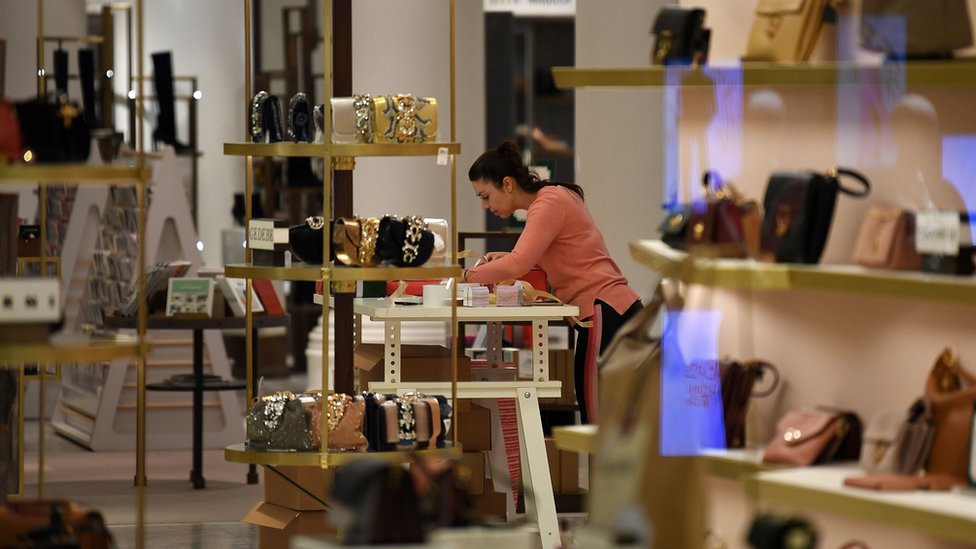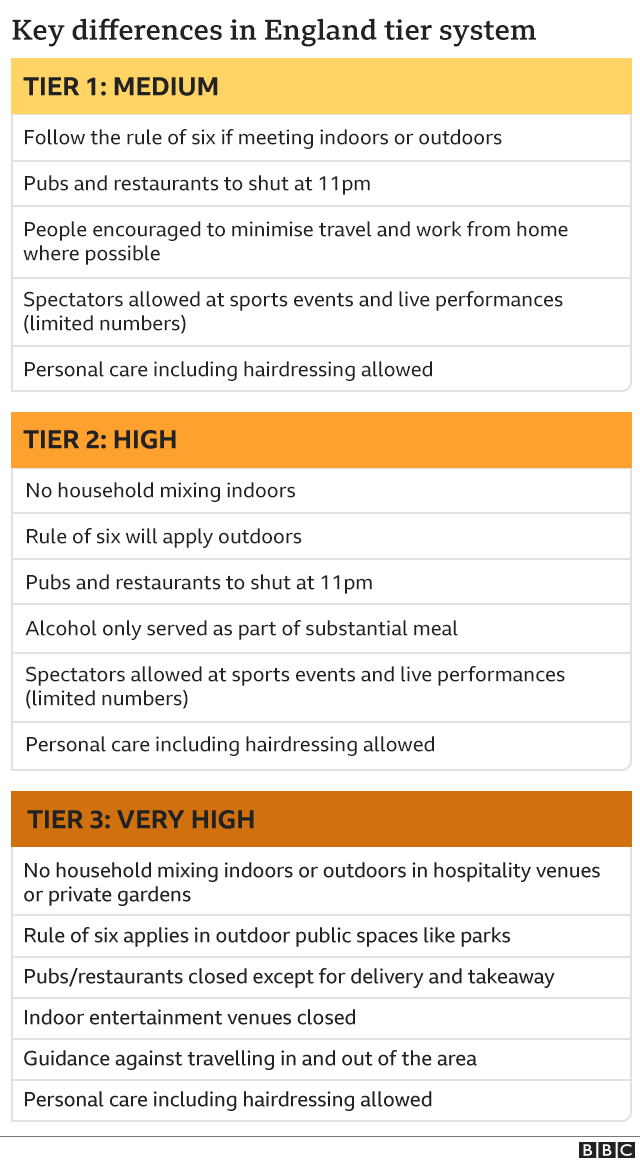
England has returned to a tiered system of coronavirus restrictions after its second national lockdown ended.
The tougher new system came into force on Wednesday after being approved by MPs in a Commons vote on Tuesday.
The government said the move would help "safeguard the gains made during the past month", despite 55 Tories voting against PM Boris Johnson's plan.
More than 55 million people are in the strictest two tiers and cannot mix indoors with those in other households.
Non-essential shops and other businesses, including personal care services such as hairdressers and beauty salons, can now reopen for the first time in four weeks.
It comes after a period which has seen the collapse of Topshop owner Arcadia group and the failure of department store chain Debenhams to secure a buyer - putting 25,000 jobs at risk.
A stock clearance sale will start at Debenhams at 07:00 GMT following the end of the lockdown.
British Retail Consortium chief executive Helen Dickinson said businesses were looking forward to welcoming back customers, with billions lost in sales during the lockdown, adding "every purchase we make is a retailer helped, a job protected and a local community supported".
Pubs and restaurants are now allowed to reopen in tier one and two areas, although in tier two alcohol can only be served with a "substantial meal".
The government has also announced that people living in care homes in England will be able to have visits from family and friends by Christmas, if the visitors test negative for coronavirus.
And later on Wednesday about 10,000 fans will be allowed into six games in the English Football League for the first time, other than a few pilot games, since March.
The new restrictions are tougher than the previous tier system, which was in place before the lockdown was introduced in November.

Under the system every area of the country is in one of three tiers - medium (one), high (two) and very high (three) - with the vast majority of the population in the higher two tiers.
In tier two, people are not allowed to mix with anyone outside their household or support bubble indoors, although they can socialise in groups of up to six outdoors.
And in tier three, people must also not mix with anyone outside their household or support bubble indoors, or at most outdoor venues.
Opening the debate in the Commons on Tuesday, Mr Johnson urged MPs to support his proposals - offering an additional £40m for some pubs in tiers two and three.
He said he appreciated the "feeling of injustice" in some areas and pledged to "look in granular detail" at the "human geography" of the virus when the tiers are reviewed.
Closing the debate for the government, an emotional Matt Hancock described how he had been personally affected by the virus, after his step-grandfather died from Covid-19.
"We can afford to let up a little, we just can't afford to let up a lot," he told MPs.
Conservative rebel Mark Harper, who chairs the lockdown-sceptic Covid Recovery Group of Tory MPs, said the government "must find a way to... end this devastating cycle of repeated restrictions, and start living in a sustainable way until an effective and safe vaccine is successfully rolled out across the population".


It's not even a year since Boris Johnson was carried to a thumping victory on the back of months of agonising parliamentary fiasco over Brexit.
And it should, theoretically, have given Mr Johnson the kind of comfortable cushion in the Commons that no prime minister had had since the days of Tony Blair.
That has hardly gone according to plan.
Despite the prime minister making appeals in person to MPs on Tuesday, although Downing Street had moved over the last few days to meet some of their unhappy MPs demands by publishing documents, and promising more votes in the near future, 55 Tory MPs banded together to give the the prime minister his biggest Parliamentary kicking yet.
With more abstaining, the message from the backbenches to the government's front row was clear - right now, Downing Street should not feel able to rely completely on their support.
Remember, the vote did actually pass. But this is a notable political moment too.

Scotland operates a five-tier system while Wales and Northern Ireland have their own coronavirus restrictions - with the latter currently in a two-week circuit breaker lockdown.
On Tuesday, a further 13,430 people tested positive for Covid-19 in the UK while a further 603 deaths were reported within 28 days of a positive test - taking the total by that measure to 59,051.


https://news.google.com/__i/rss/rd/articles/CBMiJmh0dHBzOi8vd3d3LmJiYy5jby51ay9uZXdzL3VrLTU1MTUzODk50gEqaHR0cHM6Ly93d3cuYmJjLmNvLnVrL25ld3MvYW1wL3VrLTU1MTUzODk5?oc=5
2020-12-02 02:03:00Z
52781212068131
Tidak ada komentar:
Posting Komentar